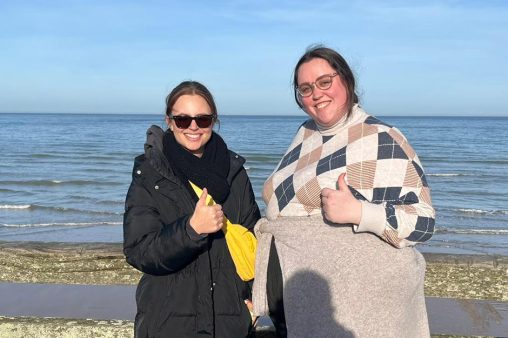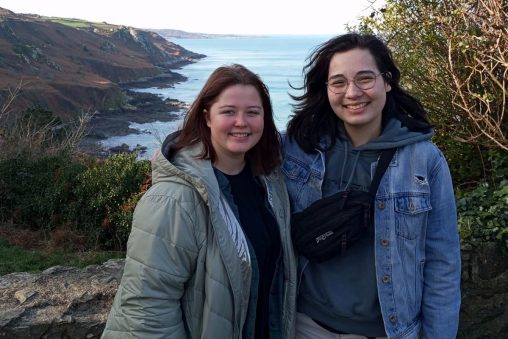
Wright State students Scarlet Coe, left, and Makenna Zehender, participated in a pilot program to improve the teaching of English in the Normandy region of France.
Wright State University students and recent graduates spent a month in the Normandy region of France in a pilot program to improve the teaching of English.
A side benefit of the project is that these students and those who follow as the program develops will make themselves more marketable as French teachers in the United States because of first-hand experiences in France’s education system.
This arrangement came about quickly. Representatives from the Academy of Normandy and the Ohio Department of Education’s world language office met with Wright State French faculty and administrators in September. The Normandy educators were looking for ways to improve their students’ English language skills.
“We suggested starting an internship program,” said Kirsten Halling, Ph.D., professor of French in the School of Social Sciences and International Studies. “We offered to recruit students to be conversation partners and teaching assistants in English classes in Normandy. Normandy got the ball rolling and found families where our students could stay.”
It was amazing that the pilot program came together as fast as it did, said Pascale Abadie, Ph.D., associate professor of French.
“Normandy helped us quickly, and we recruited students fast,” she said. “There was enthusiasm on both sides because we felt it could help both of us.”
Participating in the project were Scarlet Coe, a French and anthropology major; Makenna Zehender, a French major pursuing a multi-age education licensure; Anna Scanlon-Kimura, who graduated in December 2023 with a bachelor’s degree in nursing and a French certificate; and Sidney Stewart, who graduated in December 2023 with a degree in teaching English as a second language and a French minor.
In January, Halling and Abadie escorted the four Raiders to Normandy to get them situated and meet the host families. They returned home while the four remained for about a month.
The four from Wright State visited several schools in Normandy with classes of various subjects and a range of ages. They observed and learned about French culture.
“We’re proud that we took recent grads,” Halling said. “One complaint is that as students they have mentorship, but when they leave, they’re on their own. So, it was a great thing to provide them this internship.”
Halling said this type of internship helps French majors and teacher candidates get hired.
“Spending a month in France teaching, employers love that. Or for those who go into sales and who deal with the French, that you’ve lived with a family there and understand the French system, that’s a plus,” she said.
The Wright State contingent saw the value in their internships.
“As a future French teacher here in the United States,” Zehender said, “seeing another country’s educational system and living with a host family has already proven so valuable.”
She added, “As I talk with my students here in the U.S. I can provide more concrete details on French culture, lifestyle and language after this experience.”
“I really benefited from living with a family in Normandy,” Coe said. “I had already traveled around France twice, but this time I felt I got an insider’s view on French family culture, from the home-cooked meals to the school routine.”
Coe added, “The internship also gave me a greater understanding of the differences between the American and French styles of learning and teaching.”

December 2023 Wright State graduates Sidney Stewart, left, and Anna Scanlon-Kimura also participated in the pilot program in France.
“We were often asked to speak about American culture,” she said. “For instance, we had to respond to questions such as, ‘What is the American dream, and does it still exist?,’ which made us reflect upon our own culture. It was a highly enriching experience, for which I am truly grateful.”
“The experience living with our host families was amazing. They really included me in their daily lives and family activities,” said Stewart. “It was also the best way to immerse myself in the French language and culture.”
“The teachers in Cherbourg were nothing but welcoming and accommodating,” Scanlon-Kimura said. “I could see how much they love their work despite its difficulties.”
Halling and Abadie are already planning to introduce changes to the program, such as allowing future interns to teach more.
“We want to do more of these internships, specifically to Normandy,” Halling said.
The next such internship likely won’t be until May 2025 because of this summer’s Olympics in Paris and the 80th anniversary of D-Day in Normandy.
“The structure is in place,” Halling said. “The pilot program is really good. It’s quite a success.”

 Wright State faculty member Damaris Serrano wins Panamanian literary award
Wright State faculty member Damaris Serrano wins Panamanian literary award  Wright State grad Hannah Beachler earns Oscar nomination for production design on ‘Sinners’
Wright State grad Hannah Beachler earns Oscar nomination for production design on ‘Sinners’  Wright State alum Emily Romigh builds on a family legacy in education
Wright State alum Emily Romigh builds on a family legacy in education  Wright State receives $3 million grant to strengthen civic literacy and engagement across Southwest Ohio
Wright State receives $3 million grant to strengthen civic literacy and engagement across Southwest Ohio  Fitness Center renovation brings new equipment and excitement to Wright State’s Campus Recreation
Fitness Center renovation brings new equipment and excitement to Wright State’s Campus Recreation 